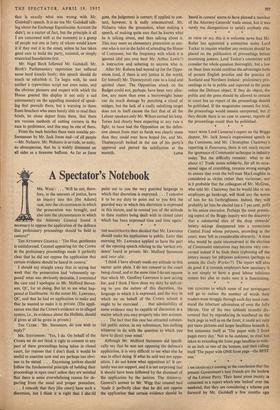A Spectator's Notebook
MR. Wino: 'Will he not, there- THE ATTORNEY GENERAL : 'The Hon. gentleman is misinformed. Counsel appearing for the Crown in the preliminary proceedings made it perfectly clear that he did not oppose the application that certain evidence should be heard in camera.'
I should say straight away that in saying last week that the prosecution had 'vehemently op- posed' what was obviously desirable, I overstated the case and 1 apologise to Mr. Melford Steven- son, QC, for so doing. But let us see what hap- pened at Eastbourne. At the outset Mr. Lawrence, QC, said that he had an application to make and that he wanted to make it in private. (The appli- cation was that the Crown's evidence as to alleged system, i.e., its evidence about the Hulletts, should if given at all be given in private.) THE CLERK: 'Mr. Stevenson, do you wish to reply?'
MR. STEVENSON: 'Yes, I do. On behalf of the Crown we do not think it right to consent to any part of these proceedings being taken in closed court, for reasons that I don't think it would be useful to examine now and are perhaps too obvi- ous to be stated. . . . Examining justices should follow the fundamental principle of holding their proceedings in open court unless they are satisfied that there is some overwhelming reason for de- parting from the usual and proper procedure. . . . I concede that they [the court] have such a discretion, but I think it is right that 1 should point out to you the very guarded language in which that discretion is expressed.. . . I conceive it to be my duty to point out to you first the guarded way in which this discretion is expressed in this statute, and to remind you of the attitude to these matters being dealt with in closed court which has been expressed time and time again.'


































 Previous page
Previous page